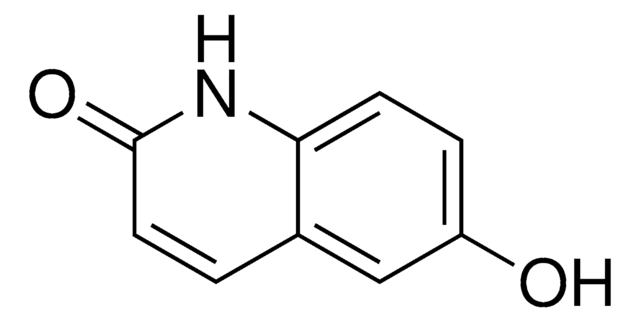424048
2,6-Quinolinediol
Sinónimos:
2,6-Dihydroxyquinoline, 6-Hydroxycarbostyril
Iniciar sesiónpara Ver la Fijación de precios por contrato y de la organización
About This Item
Fórmula empírica (notación de Hill):
C9H7NO2
Número de CAS:
Peso molecular:
161.16
Número MDL:
Código UNSPSC:
12352100
ID de la sustancia en PubChem:
NACRES:
NA.22
Productos recomendados
mp
>300 °C (lit.)
cadena SMILES
Oc1ccc2nc(O)ccc2c1
InChI
1S/C9H7NO2/c11-7-2-3-8-6(5-7)1-4-9(12)10-8/h1-5,11H,(H,10,12)
Clave InChI
AQLYZDRHNHZHIS-UHFFFAOYSA-N
Descripción general
2,6-Quinolinediol is a substituted quinoline compound. It has been prepared starting from 6-methoxyquinoline. It has been reported to be one of the UV-absorbing compounds (UAC) found in cow milk.
Aplicación
2,6-Quinolinediol may be used as a test compound to investigate the carcinogenicity of the naturally occurring quinoline metabolite of tryptophan. The study was conducted by suspending tryptophan metabolites in cholesterol pellets, followed by the surgical implantation of the pellets into the mice bladder. It may be used as a reactant in the synthesis of 2-chloro-6-quinolinol by reacting with POCl3 (phosphorus oxychloride).
Reactant involved in synthesis of:
- (Benzyloxy)methylquinolinone derivatives for use as PDE3 inhibitors
- Substances related to cilostazol
- 2,6-Quinolinyl derivatives for use as VLA-4 / VCAM-1 antagonists
Palabra de señalización
Warning
Frases de peligro
Consejos de prudencia
Clasificaciones de peligro
Eye Irrit. 2 - Skin Irrit. 2 - STOT SE 3
Órganos de actuación
Respiratory system
Código de clase de almacenamiento
11 - Combustible Solids
Clase de riesgo para el agua (WGK)
WGK 3
Punto de inflamabilidad (°F)
Not applicable
Punto de inflamabilidad (°C)
Not applicable
Equipo de protección personal
dust mask type N95 (US), Eyeshields, Gloves
Elija entre una de las versiones más recientes:
¿Ya tiene este producto?
Encuentre la documentación para los productos que ha comprado recientemente en la Biblioteca de documentos.
2, 6-Quinolinyl derivatives as potent VLA-4 antagonists.
Lassoie MA, et al.
Bioorganic & Medicinal Chemistry Letters, 17(1), 142-146 (2007)
Mouse bladder carcinogenicity of certain tryptophan metabolites and other aromatic nitrogen compounds suspended in cholesterol.
Bryan GT, et al.
Cancer Research, 24(4), 596-602 (1964)
In vivo elution of tryptophan metabolites and other aromatic nitrogen compounds from cholesterol pellets implanted into mouse bladders.
Bryan GT, et al.
Cancer Research, 24(4), 586-595 (1964)
Pascal Rouge et al.
Food chemistry, 141(3), 1888-1894 (2013-07-23)
The aim of this work was to characterise new UV-absorbing compounds (UAC) in cow milk in order to gain an overview of the molecular diversity of the minor bioactive constituents, that could be used to trace animal feed or that
Nuestro equipo de científicos tiene experiencia en todas las áreas de investigación: Ciencias de la vida, Ciencia de los materiales, Síntesis química, Cromatografía, Analítica y muchas otras.
Póngase en contacto con el Servicio técnico








